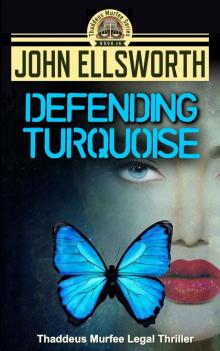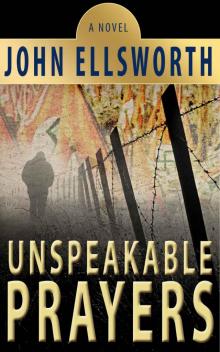- Home
- John Ellsworth
Hellfire (Sisters In Law Book 2)
Hellfire (Sisters In Law Book 2) Read online
Hellfire
Sisters in Law
John Ellsworth
Jode Ellsworth
Penny Lawn Press
Contents
HELLFIRE: SISTERS IN LAW
Chapter 1
Chapter 2
Chapter 3
Chapter 4
Chapter 5
Chapter 6
Chapter 7
Chapter 8
Chapter 9
Chapter 10
Chapter 11
Chapter 12
Chapter 13
Chapter 14
Chapter 15
Chapter 16
Chapter 17
Chapter 18
Chapter 19
Chapter 20
Chapter 21
Chapter 22
Chapter 23
Chapter 24
Chapter 25
Chapter 26
Chapter 27
Chapter 28
Chapter 29
Chapter 30
Chapter 31
Chapter 32
Chapter 33
Chapter 34
Chapter 35
Chapter 36
Chapter 37
Chapter 38
Chapter 39
Chapter 40
Chapter 41
Chapter 42
Chapter 43
Chapter 44
Chapter 45
Chapter 46
Chapter 47
Chapter 48
Chapter 49
Chapter 50
Chapter 51
Chapter 52
Chapter 53
Chapter 54
Chapter 55
Chapter 56
Chapter 57
Chapter 58
Also by John Ellsworth
About the Authors
Dedication
Copyright
Reviews
HELLFIRE: SISTERS IN LAW
by
John Ellsworth
&
Jode Ellsworth
1
The target was Arum al-Assad, the ISIS oil czar.
The place was Syria--a country gripped in a civil war and overrun by terrorists who called themselves Islamic State of Iraq and al-Sham: ISIS.
Riding lazy thermals at 20,000 feet, the Predator drone had followed Arum al-Assad to a stone house in Deir ez-Zor, eastern Syria. The purpose of the oil czar's trip from Damascus to Deir ez-Zor was unknown to the U.S. The U.S. authorities believed his movement had something to do with the sale of crude oil. So they followed him. Blackguard demanded no less.
The people al-Assad was meeting inside the stone house were likewise unknown to the U.S. What was known was that the drone operator in Reno, Nevada claimed a high-value target in Arum al-Assad. The "high-value" designation came from Blackguard. Blackguard wanted an immediate missile strike. The drone pilot was ready to pull the trigger but he lacked green authorization. So he keyed his data into Big Sister and waited. Five minutes later he received the call in his headset. "You are green to go, Black Cat. Repeat, green to go."
The drone pilot launched one Hellfire missile. As the missile tore free of the rails, a new optical tracking image flashed on his flat screen. Estimated close to target was less than four seconds.
The targeted stone house was a large two story. Gathered inside were Sevi al-Assad, who was the sister of Arum al-Assad, the target; their grandmother--who owned the house; their parents; and their extended family.
Sevi was marrying Mohammad al-Marri that evening. A wedding feast was cooking and long tables made ready for the thirty wedding guests. Under roof was also the groom's entire family. Then there were additional friends and business acquaintances and one low-level cabinet member from the Deir ez-Zor Governorate, whose job was water quality control for the Muslim community of 211,857.
As custom dictated, the bride and her entourage prepared on the second floor of the house while the groom and his fellows prepared on the first. Neither bride nor groom had seen the other for twenty-four hours now.
Sevi, the bride, was elated when her brother Arum arrived mid-day. They hadn't seen each other in a year, as he was the ISIS Oil Minister and always traveling on business. Neither had any idea he was an eyes-on target of the U.S. military, nor should they have. While he worked with ISIS oil planning, he preferred to think his role was discreet and his identity was unknown to the outside world.
Sevi had no ISIS zealotry running in her blood and, while she didn't relate to her brother's motives and methods, all those differences were shed at the door. This was a glorious time of five-thousand-year-old ritual and feasting and today's problems were left outside in the dust. Because Arum was not part of the wedding party, he was allowed upstairs to visit his sister.
They embraced and she cried, her cheek on his chest. He patted her and reassured her all was well and that he was always with her. The fight, he assured her, was going well and he was safe. Then they sat on the bed in her private bedroom and held hands and talked. She updated him on their father's business venture. Father had recently taken over a plant that manufactured automobile tires. She emphasized that father missed having his son assist him in the business. Arum studied the colorful bedspread and sadly shook his head. "I cannot," he said. "There is Syrian oil to sell and I am needed."
"Where will you sell it?"
"To the Chinese."
"Not to the Americans?"
"Never to the Americans."
"But is that safe? What if the Americans learn that Syrian oil is destined for the Chinese?"
"As Allah instructs, Muslim people are to prosper. The Chinese will pay double what the Americans are willing to pay."
"So that makes it an easy decision for you."
"Exactly."
As Sevi and Arum talked, the hurried preparation of female children continued within the next two bedrooms on the same floor. Hair was being combed out and fashioned into party coiffures, light blush was allowed for girls over ten, and perfumes misted the air as fragrances were tested on thin young wrists.
One floor beneath the junior girls' preparation the boys were having their rust knocked off. Baths were made ready, all orifices scrubbed and inspected by fathers made wary by the boys' antipathy toward soap and predilection for wrestling in the sandy soil outside. Luxurious clothes, unpacked the day before and hung around the walls to lessen wrinkling, were now sorted and donned as males of all ages made ready. Sevi and Arum's two younger brothers were included in that male admixture, alternately rough-housing with other boys and being snatched upright by their father and made to stand still while they were dressed in their best.
The Lockheed-Martin Hellfire was an air-to-surface missile developed for precision strikes against individuals. The missile was developed under the name Helicopter Launched, Fire and Forget Missile, which led to the acronym "Hellfire" that became the missile's formal name. The thermobaric weapon was a type of explosive that utilized oxygen from the surrounding air to generate an intense, high-temperature explosion. In practice its blast wave was significantly longer in duration than a conventional condensed explosive--the better to kill you with. And it was the last thing on earth the wedding party imagined would be introduced into their dwelling.
The missile entered the bedroom two doors down from Sevi and Arum, instantly killing all thirteen occupants--four adult women, four girls under the age of twelve, and five early-teen girls. Continuing through the ceiling to the first floor, the missile exploded and sucked all oxygen out of the house and ignited lungs with flame that killed everyone except Sevi al-Assad. She was located furthest from the blast and was blown out of the second floor
bedroom as the wall fell away. Then the house caved in on itself, marking the scene as a spent funeral pyre.
No cries were heard, no moans of pain, no tortured breathing.
Spread-eagled across the bed of a Toyota pickup truck where she had come to rest was Sevi, twenty-four years old. She lay unconscious, which was, in a desperate way, fortuitous because her back was broken, her left eardrum gone and her left kneecap torn loose and lying on her thigh. Had she been conscious she likely would have died from shock. Sirens sounded across the city of Deir ez-Zor. Pedestrians stopped in their tracks as their eyes searched the skies for the Predator responsible for the thick black smoke on the eastern end of the city. Many would be dead; the TV would broadcast accounts that night and another unfathomable tragedy would fashion a new population of West haters.
Before the EMTs arrived, a next-door neighbor discovered Sevi and stood watch over her broken body, discouraging those who would otherwise try to move her.
"Wait!" he told them. "She is injured and we don't know how badly. We'll wait for the EMTs!"
When the EMTs came, Sevi was expertly manipulated on a backboard and strapped in place for hospital transport.
At the hospital, it was determined she was alive.
But just barely.
2
Blackguard was ruthless in its pursuit of oil.
Sevi's brother, Arum al-Assad, had died because of his plan to sell crude oil to the Chinese instead of the Americans. Blackguard had come into this information through the use of paid informants. Blackguard belonged to the DuMont brothers; American oilmen who, in the end, believed all oil beneath the earth belonged to them.
It was all part of a much larger picture for the DuMont brothers.
They thought themselves patriots. They believed in the drastic reduction of corporate income taxes, the dramatic de-funding of services for the needy, and they opposed climate change activists on all fronts.
Their names were Wilfred and Edlund DuMont and they had inherited a two hundred billion dollar fortune from their wildcatter father, who was said to have drained off a trillion barrels of Texas crude for his five thousand service stations across North America.
The brothers were Massachusetts born and bred. They had graduated from Harvard Law two years apart, and were three years apart in age. Both had degrees from Yale in economics and both envisioned a return to the days before the EPA was formed with its regulations and restraints on drilling. They longed for the time when business had unfettered access to petroleum and coal reserves, and the clear-cutting of forests made good economic sense.
Wilfred was born in 1935 and Edlund in 1933. They were too young to serve in World War II and Korea, and sat out the Vietnam War, thanks to draft deferments handed out by John Kennedy not only to the unwashed but also to Libertarian elitists like the brothers. The whole Vietnam fiasco offended the brothers' economic sensibilities so they contributed twenty million dollars to Richard M. Nixon's campaign. It was thought a President Nixon would immediately withdraw America's military. Vietnam possessed no oil; rice and bananas were the chief exports; so why make war there?
The wars of the Middle East were another matter altogether. Those wars were about oil and oil was to America what coal was to electricity. In 2009, when ISIS was struggling to arm its soldiers and feed the citizens of seized cities, the brothers boldly stepped forward. In return for Russian Kalashnikov AK-47 rifles, the leaders of ISIS entered into secret leases of Iraqi oil fields with the brothers. The leases would take hold and the oil would begin flowing to DuMont oil tankers when the Syrian president was deposed and the flag of ISIS flew over the Syrian Desert. Arum al-Assad had gone back on the deal with his plan to sell Syrian oil to China. He died for that.
While these machinations were cloaked in secrecy, they didn't escape the notice of America's Fifth Estate in the person of one Althea Berenson, a freelancing journalist. She had blown the lid off things with a series of reports on the link between a certain vice-president during the Bush W years and a certain business owned by the DuMonts that masqueraded as a construction company. That company operated on a massive scale--erecting the Baghdad Green Zone in sixty days following the American victory over Saddam Hussein. The feat required forty thousand carpenters, plumbers, electricians, and engineers. It was said to have airlifted one hundred times the material delivered by Allied aircraft during the 1948 Berlin Airlift. The Berlin job was primarily the work of the DuMont brothers' sire, Colonel Edmund Hillary DuMont. The Green Zone was primarily the work of Blackguard, the brothers' global construction, acquisition, and vigilante arm.
When Althea Berenson discovered the link between the vice-president and Blackguard, her newspaper series was nominated for a Pulitzer. But then the vice president taught America what NFL running backs had long known: the virtues of misdirection. The VP's office exposed a CIA field agent, which obfuscated the appointment of a Special Prosecutor and the jailing of a minor talent among the VP's staff--a sentence later commuted by the president.
During the brouhaha that followed the CIA agent outing, the VP made his getaway to Montana, retiring there in near-seclusion while remaining "quaintly quotable"--his literary agent's words--when party politics required a hatchet job. But Althea Berenson wasn't finished with the story of the transfer of American treasure to Blackguard; rather than let the story die when the VP retired, she reversed field and went after Blackguard itself. The public's eye followed.
The war in Iraq earned Blackguard a half trillion dollars. Blackguard vice-presidents purchased island hideaways; Gulfstream jets were ordered by the hundreds; fabulous parties were thrown that began in Miami Beach and ended when the sun came up in Tokyo. One thousand Hollywood-ites were feted in Vancouver over a weekend that included, in the swag baskets, a three-carat diamond ring and a five thousand dollar marker for a posh Atlantic City casino. In the end it was said the U.S. Mint had established a Baghdad printing facility. Hundred dollar bills flew off the press 24/7 and truckloads of cash sallied forth to buy the allegiance of tribal heads and Blackguard soldiers. It was, Althea found, money in the extreme. It was, Althea wrote, the greatest transfer of public monies to a private company in American history. Of the five hundred billion dollars in question, Althea further reported the DuMont brothers had secretly pocketed--loosely speaking--one hundred billion for themselves.
Ten years later they were funding presidential campaigns to the tune of one hundred million dollars. So far their handpicked stooges had run unsuccessfully, but the brothers knew it was only a matter of time until they'd win. Before 2024 they expected to fund and thus own an American president. So Althea's reportage went. The only way to prevent this happening, she determined, was to break a story that revealed the brothers for what they were: Machiavellian puppeteers ready to recreate the United States as a Libertarian plutocracy. In short, the one percent would progress from ruling the country economically to ruling it politically as well. America would become a true dictatorship controlled by two brothers with oil coursing through their veins.
* * *
Althea Berenson was black, thirty-five and remained hot on the trail of Blackguard's scent. Althea wore a size six and was mocha complected, like her friend Christine, but she wore her hair short while Christine wore hers long. Althea was a mother of four, and a two-time bride who was enjoying singularity now that the kids could babysit themselves and ex-husbands could be prevailed upon for weekend fathering. This new order freed up the journalist for her travels and restored her strength for her travails as she published widely and as she appeared on HBO's Real Time with Bill Maher.
Her public persona was forever argumentative and confrontational while her private persona was gentle and loving, especially with her children and her men. The kids were a given; the men came and went.
Friendships abounded among Chicago's greater and lesser lights. Althea worked South Side food drives as capably and gracefully as she worked North Shore charity auctions. During the social mix she became friends
with Christine Susmann, the attorney defending the husband of Althea's college roommate on two counts of income tax evasion. A coffee was held to raise legal fees for the husband's defense fund. At the last minute Christine Susmann attended and proclaimed the coffee unnecessary as she was going to offer a free defense. Which she did. The husband served nine months in the same federal lockup where Martha Stewart had cleaned washrooms for lying to the FBI. That alone was enough for the husband to claim victory.
* * *
Althea and Christine began meeting for Wednesday lunch.
A few months later, Winona Lindsey joined them. She was a Chicago Police detective who had jumped ship and now worked as a full-time investigator for Christine's law firm. Where Althea was compact and cherubic around the face, Winona was tall, muscular, and capable of taking out a kneecap with a leg sweep. Her naturally blonde hair was often worn pulled back in a ponytail. And at night, when Winona was on the town, it would be worn down and brushed to a luster. Where Althea was an intrepid researcher and Winona was a fearless detective, Christine was both weight lifter and firearms expert who swore allegiance to the rule of law. But even while confirming her respect for the law, Christine would slam home a .40 caliber magazine. And of course Christine was a lawyer's lawyer; beginning as a JAG paralegal during her army days and then working as a paralegal for Thaddeus Murfee. Christine had come into her own after suing the president of Russia and paying for law school with his dollars.
Today they were meeting in Reynaldo's Bistro, an upscale Michigan Avenue eatery in Chicago on the North Loop. Reynaldo's was frequented by members of the local bar bent on keeping a low profile in a diner geographically removed from the Chicago legal system, which held court on the South Loop.
Althea arrived first, grabbed a table for four, and was systematically reviewing the menu a line at a time. So far, nothing had struck her fancy. A White Russian found its way to her and she took a mouthful and tilted her head back, allowing the chilled liquid to do its work on her alimentary canal while sparking her taste buds like Christmas tree lights. She was, in a word, happy with the world. White Russians and crowded menus did that to her yet never moved the needle on the size six ensembles.

 Girl, Under Oath (Michael Gresham Series)
Girl, Under Oath (Michael Gresham Series) The Fifth Justice (Michael Gresham Legal Thrillers Book 10)
The Fifth Justice (Michael Gresham Legal Thrillers Book 10) Michael Gresham (Book 5): Sakharov the Bear
Michael Gresham (Book 5): Sakharov the Bear Voices In The Walls: A Psychological Thriller (Michael Gresham Series)
Voices In The Walls: A Psychological Thriller (Michael Gresham Series) Chase, the Bad Baby: A Legal and Medical Thriller (Thaddeus Murfee Legal Thriller Series Book 4)
Chase, the Bad Baby: A Legal and Medical Thriller (Thaddeus Murfee Legal Thriller Series Book 4) The Girl Who Wrote The New York Times Bestseller: A Novel (Thaddeus Murfee Legal Thrillers Book 8)
The Girl Who Wrote The New York Times Bestseller: A Novel (Thaddeus Murfee Legal Thrillers Book 8) The Defendants: Crime Fiction & Legal Thriller (Thaddeus Murfee Legal Thriller Series Book 1)
The Defendants: Crime Fiction & Legal Thriller (Thaddeus Murfee Legal Thriller Series Book 1) Hellfire (Sisters In Law Book 2)
Hellfire (Sisters In Law Book 2) A Young Lawyer's story
A Young Lawyer's story Annie's Verdict (Michael Gresham Legal Thrillers Book 6)
Annie's Verdict (Michael Gresham Legal Thrillers Book 6) Legal Thriller: Michael Gresham: Secrets Girls Keep: A Courtroom Drama (Michael Gresham Legal Thriller Series Book 2)
Legal Thriller: Michael Gresham: Secrets Girls Keep: A Courtroom Drama (Michael Gresham Legal Thriller Series Book 2) 30 Days of Justis
30 Days of Justis Sakharov the Bear (Michael Gresham Legal Thrillers Book 5)
Sakharov the Bear (Michael Gresham Legal Thrillers Book 5) Defending Turquoise (Thaddeus Murfee Legal Thriller Series Book 5)
Defending Turquoise (Thaddeus Murfee Legal Thriller Series Book 5) The Near Death Experience (Thaddeus Murfee Legal Thriller Series Book 10)
The Near Death Experience (Thaddeus Murfee Legal Thriller Series Book 10) Unspeakable Prayers: WW II to Present Day (Thaddeus Murfee Series of Legal Thrillers)
Unspeakable Prayers: WW II to Present Day (Thaddeus Murfee Series of Legal Thrillers) Attorney at Large (Thaddeus Murfee Legal Thriller Series Book 3)
Attorney at Large (Thaddeus Murfee Legal Thriller Series Book 3) The Law Partners (Michael Gresham Legal Thriller Series Book 3)
The Law Partners (Michael Gresham Legal Thriller Series Book 3) Annie's Verdict
Annie's Verdict The Mental Case (Thaddeus Murfee Legal Thriller Series Book 6)
The Mental Case (Thaddeus Murfee Legal Thriller Series Book 6)